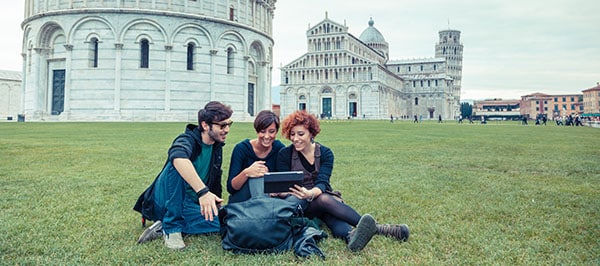Ah, la dolce vita. You’ve finally attained your dream of being able to study in Italy! Get together with friends and have a glass of prosecco! Congratulations!
…Or are these celebrations happening too soon? Have you considered what really goes into moving in order to study abroad? Are you adequately prepared? Don’t freak out yet: I’ve done it myself, and because of my own experiences, I’ve compiled a list of tips and advice on managing yourself while living abroad. You’re going to have the experience of a lifetime, but make sure you’re ready for it!
The first thing you need to do is deal with the administrative side of things. Your school may be able to help you with some of this.

- First, I cannot stress this enough: make sure you set aside enough time before your departure date to get your Visa approved with the Consulate General here in the U.S. If you have acquired dual citizenship with Italy make sure that you have your Italian passport and check with the Consulate and your school to see if there is anything else you need to do in order to live in Italy as a citizen without a Visa requirement! It could take as long as a few weeks to a few months, so I was grateful that my school warned us beforehand about this.
- This goes without saying, but make sure you’ve secured a place to stay while you’re abroad. Try to check out websites that are no-fee rentals to help you browse. If you can, try to visit Italy once before your semi-permanent residence to check out the apartment you’re interested in and the area surrounding it. From my own personal experience, I had an apartment that I was glad I didn’t blindly rent just based upon having read it online: it looked great on paper, but in reality, it would have been a disaster living there for a year and a half and having to commute to school. My mom and I visited Florence the summer before I was scheduled to move and visited this apartment in particular. The place was described as being venti minuti dal centro. For those of you who know Italy’s infrastructure – the way the buses run (vaguely on a schedule, but not really; and don’t even get me started on the holiday schedules!), the traffic, etc., this estimate went out the window. Things are so different in reality, rather than the blissful optimism that an apartment owner can write in an online recensione of the apartment they’re trying to rent, so please be careful!

- Get internet access for your apartment (and make sure you know the nearest internet café because your internet is not going to be reliable…).
- Get Euros to travel with. Yes, this is going to help you immensely. Almost all places in Italy are going to take credit cards, but you never want to be stuck without cash.
- As soon as you arrive, get your codice fiscale – because the owner of the apartment needs to have this information in order for your lease to be valid! I made the mistake of entering into a lease as soon as I arrived without the codice fiscale, but thankfully the apartment owners were amenable and said they could fill in the number later. It would have been a lot easier had I just been prepared.
- Opening an Italian bank account is a good idea. You’re going to need to have a place to store your extra Euros. Most places will be willing to explain the legal mumbo-jumbo in English to help you. I bet you never thought of opening a bank account, right? At least I didn’t when I first arrived!
- Get any maps you can and buy a student ID (if you’re eligible) for the bus or train system. Some Italian cities have certain requirements for you to buy a student ID (i.e. taking classes in Italian universities or being a European citizen). If you’re not eligible for a student ID, make sure you learn how public transportation works in Italy where you need to buy a ticket for each ride and then have it stamped/validated while on-board.
- Before arriving, try to have some of your items shipped. For me, at least, I needed some books for my thesis, my computer, my printer, etc. (tons of heavy stuff), so rather than having the airline force me to pay a fee for having too much luggage, I sent some of my stuff by mail. Everything was not able to fit in one suitcase to go on the airplane.
I can go on and on about the administrative side of things, but those are a few of the more important items I would recommend tackling.

Now that you’ve handled the admin side of things (phew! What a headache!), now it’s time to have fun!
- Act the part. Walk around as much as you can (see item 2 below) and try to imitate the dress of Italians. Avoid wearing shorts where you can, though if the heat gets too much for you during the summer months, I can understand. But try not to be pegged as a tourist!
- Be prepared to get lost! Getting lost is all the fun – at least it was for me! You may discover something really cool that isn’t on a map or a restaurant you really wouldn’t have tried without just stumbling into it by accident. And of course, the architecture of every Italian city is going to be amazing, and walking around the city is going to be great for people-watching. Make sure you’re never traveling alone if you’re uneasy about directions and make sure you learn which areas you shouldn’t explore after dusk (usually the areas closest to the train station should be avoided when it’s dark). Which leads me to my next point…
- Make friends!!! No pressure here, but you’re obviously going to want to find people to spend time with. I’m sure for those of you studying abroad, your school has plenty of opportunities to make friends with other Americans in your program. Make sure you attend those types of networking events, even if some of them seem corny! Once you have a group of friends to go out with….
- Dinners, dinners and more dinners! When I was studying abroad, I made sure to have a dinner of the week club with my group of friends. I’m sure eating out in Italy will become your favorite part of living there too. The types of experiences you’ll have, the people you’ll encounter, the FOOD, the WINE! You’ll love it all! If you’re strapped for cash, I recommend taking advantage of the aperitivo which is like the American version of the “Happy Hour,” but on steroids. They require you to buy one drink, usually around 6-8 Euros, and then you can eat unlimited food! Some of these aperitivi are better than others (meaning those that have more food), so check out which ones in your city are the best.
- Always try to speak Italian! Always! Italians will treat you better if they see you’re trying to converse with them in their language. If you’re really struggling, they’ll be sure to switch to English if they know how to speak it. So check your shyness at the door and put those language skills to use!
- Get Skype. You may not think it, considering all the fun escapades you’ll be on, but you’re going to miss your loved ones you left back in the U.S.
- My biggest advice to you I’ve saved for last, which is be patient, be patient… BE PATIENT!!! Things are going to move a lot slower in Italy. You’re going to have an amazing time while in Italy, but if you’re high-strung and anxious, you may not appreciate it as much. So sit back, relax and let things pan out the way they will. Happy travels!
